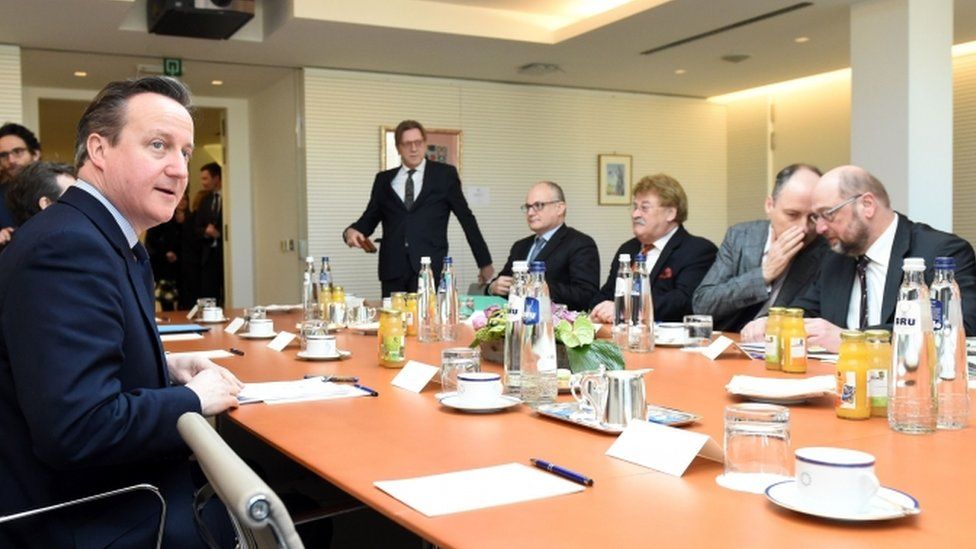EU referendum: David Cameron deal 'gets backing of Euro MPs'
- Published

The leaders of the three largest groups in the European Parliament have "made clear their support" for the UK's EU deal, Downing Street has said.
They also told David Cameron they would take "necessary legislation" through parliament "swiftly", said No 10.
A final deal on UK renegotiation may come when EU leaders meet on Thursday.
But some parts may still need European Parliament approval. Its president pledged to be constructive even though he could not guarantee MEPs' backing.
Mr Cameron also met European Commission President Jean-Claude Juncker to discuss the reforms the UK is seeking to its relationship with the EU, as he continues his diplomatic push "where there are still details to be nailed down".
Before meeting Mr Cameron, Mr Juncker said there was no "plan B" as he refused to contemplate Britain leaving the 28-member bloc.
"I am not entering into the details of a plan B, because we don't have a plan B, we have a plan A. Britain will stay in the European Union as a constructive and active member of the Union," he said.
A guide to how the EU works
How does the European Union work?
European Council president Donald Tusk, who is overseeing the UK's renegotiation - which is taking place before the British people vote in a referendum on whether or not to stay in the European Union - has said talks on the draft deal were "fragile".
On Monday, he warned that the negotiations over the UK's demands were at a "critical moment" and "the risk of break-up is real".
In a separate development on Tuesday the Duke of Cambridge, Prince William, spoke at a Foreign Office awards ceremony of how "in an increasingly turbulent world, our ability to unite in common action with other nations is essential".
Prince William: "For centuries Britain has been an outward looking nation"
This was interpreted by some as signalling the Duke's support for staying in the EU, with Britain Stronger in Europe saying "people from all walks of life are getting behind the campaign". However the rival Leave.EU campaign said they "could just as easily claim" his words showed "we should not give any importance to the EU".
A spokesman for the prince later denied it was an intervention in the EU debate, saying it was a speech to young diplomats and the word "Europe" was not mentioned once.
'Not binding'
European Parliament president Mr Schulz, who described his meeting with Mr Cameron on Tuesday as "very constructive", said that once a deal was agreed by EU leaders, MEPs would start the legislative process as soon as possible.
But he cautioned: "To be quite clear: no government can go to a parliament and say, 'this is our proposal, can you give a guarantee about the result?' This is, in democracy, not possible.
"Therefore my answer is the European Parliament will do the utmost to support compromise and a fair deal, but I can't pre-empt the result in the European Parliament."
President of the European Parliament was speaking after talks with David Cameron
He said in his experience "it does go in a good direction" when there has been such an agreement between all the heads of state.
Mr Schulz also insisted that everything must be done within the framework of EU treaties, saying no treaty changes are possible "for the time being".
Critics argue that the European Parliament could change the terms of the deal after the UK referendum if Britain voted to remain in the EU.
Leave.EU - one of the groups campaigning for an EU exit - said Mr Schulz's comments showed the PM's draft deal "is not binding without a new treaty that the European Court in Strasbourg has to adhere to".
Benefits compromise?
Mr Cameron's planned curbs to child benefit for EU migrants appear to be a sticking point in the talks with the EU, with unease from eastern European countries.
European Commission President Mr Juncker said he expected the proposed benefit changes to be at the heart of debate this week.
Czech Europe minister Tomas Prouza told BBC Radio 4's Today programme he expected the proposals would only apply to new applicants, and not affect the existing 34,000 migrants in the UK who receive it.
Downing Street has so far refused to say whether the changes extend to existing claimants or not.
The move is likely to prompt further accusations that the PM is having to water down his demands, having originally proposed halting the payment of child benefit altogether. Instead, the benefit payments would be linked to the cost of living in the country where the child lives, under the terms of the draft deal.
If a deal is agreed on the PM's reforms, he will hold a cabinet meeting on Friday evening, sources have told the BBC.
Downing Street has said ministers cannot speak out until the cabinet has met to agree a government position, and it had been claimed this would give the Remain campaign an unfair head start if a meeting was delayed until the following week.
Mr Cameron is seeking key changes on European integration, business competiveness, benefits restrictions and the operation of the eurozone.
The prime minister has promised an in-out referendum on whether the UK should remain within the EU by the end of 2017.
Are you in the UK or any other EU member state? What are your views on the current negotiations? What outcome are you seeking? Share your views. Email haveyoursay@bbc.co.uk.
Please include a contact number if you are willing to speak to a BBC journalist. You can also contact us in the following ways:
- Whatsapp: +44 7525 900971
- Send pictures/video to yourpics@bbc.co.uk
- Upload your pictures / video here
- Tweet: @BBC_HaveYourSay
- Send an SMS or MMS to +44 7624 800 100
- Published15 February 2016
- Published15 February 2016